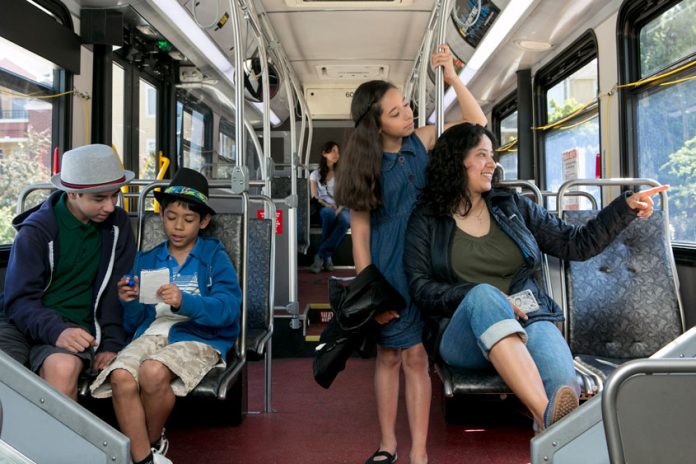
Seattle is now offering all public middle school students in Seattle free transit passes through the ORCA Opportunity program. This builds upon a program that already provides free transit to public high school students, lower-income public middle school students, and Seattle Promise Scholars as well as Seattle Housing Authority (SHA) participants.
Alex Hudson, Executive Director of Transportation Choices Coalition, lauded expansion of the program. “Expanding ease of access to public transit is a key element of creating a climate resilient and socially equitable city,” she said in a statement. “This transit expansion project will help get more young Seattleites where they need to go safely and reliably, while also lowering transportation costs for families and empowering a new generation of transit riders.”
The announcement of an expanded ORCA Opportunity program came Monday when Mayor Jenny Durkan issued an order focused on climate action priorities of her administration. Expansion of the program is expected to cover up to 8,000 middle schoolers. This is in addition to 15,000 high school students, 1,000 Seattle Promise Scholars, and 2,000 SHA participants.
Seattle Public Schools middle schoolers will need to apply for their free ORCA cards to benefit from free transit. Delivery of the cards to students requesting cards will begin on Tuesday, November 9th. Deliveries will happy every Tuesday and Wednesday thereafter. Seattle Public Schools high schoolers can also still get free pre-loaded ORCA cards by completing a required form.
The ORCA cards are valid for middle and high school students through August 31, 2022. The same applies for Seattle Promise Scholars whereas SHA participants with ORCA cards are only valid through February 28, 2022. Use of the cards can be on any public transit service within Puget Sound that accepts ORCA, except on Washington State Ferries.
Funding for the program expansion is coming from the Seattle Transportation Benefit District, which was reauthorized by voters through passage of an additional 0.15% sales tax last year.
As part of the mayor’s order, the Seattle Department of Transportation (SDOT) has been tasked with conducting “an analysis to fully evaluate options to equitably expand fare free programming, with a focus on all youth in Seattle under age 18.” As part of this, the order directs the department to “consider the equity and climate implications of a new or expanded fare free program and include engagement with youth, centering those from BIPOC communities, from low-income and unhoused families, and youth with disabilities” and “identify factors to consider before any expansion of a fare-free program, which may include policy development, operational costs and capacity, financial feasibility, and partnerships.” This analysis along with recommendations are expected to be delivered by July 31, 2022.
Free transit programs have been quite successful in the city since being implemented. Over the summer, the city rolled out the ORCA Recovery Cards program, which focused on food service and grocery workers in Chinatown-International District and Pioneer Square. Some 1,665 people signed up for the unlimited transit program with 91% of surveyed respondent participants saying they use transit more often and 84% saying they use their card three or more times per week. In a report from 2017, SDOT noted that youth usage of the cards was quite positive and helped students get around for daily activities.
Ultimately, the free transit passes for students is a positive for climate in the short-term by encouraging sustainable trips. But building a culture of transit usage among students at a young age could deliver longer-term climate benefits, too, by establishing habits around transit as a primary mode instead of driving. And it could help empower the next generation of advocates and voters to support sustainable transportation investments, which is critically important in combating climate change.
Stephen is a professional urban planner in Puget Sound with a passion for sustainable, livable, and diverse cities. He is especially interested in how policies, regulations, and programs can promote positive outcomes for communities. With stints in great cities like Bellingham and Cork, Stephen currently lives in Seattle. He primarily covers land use and transportation issues and has been with The Urbanist since 2014.


